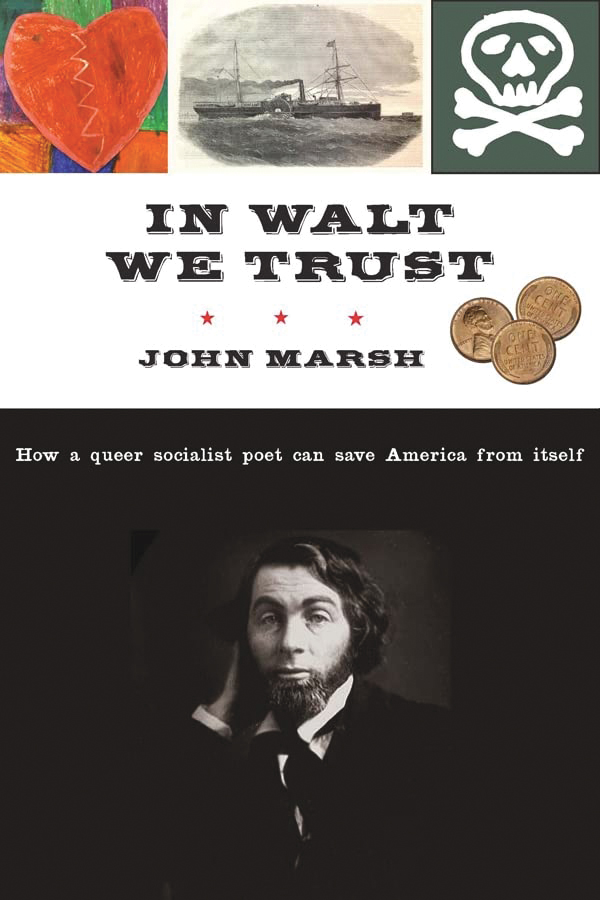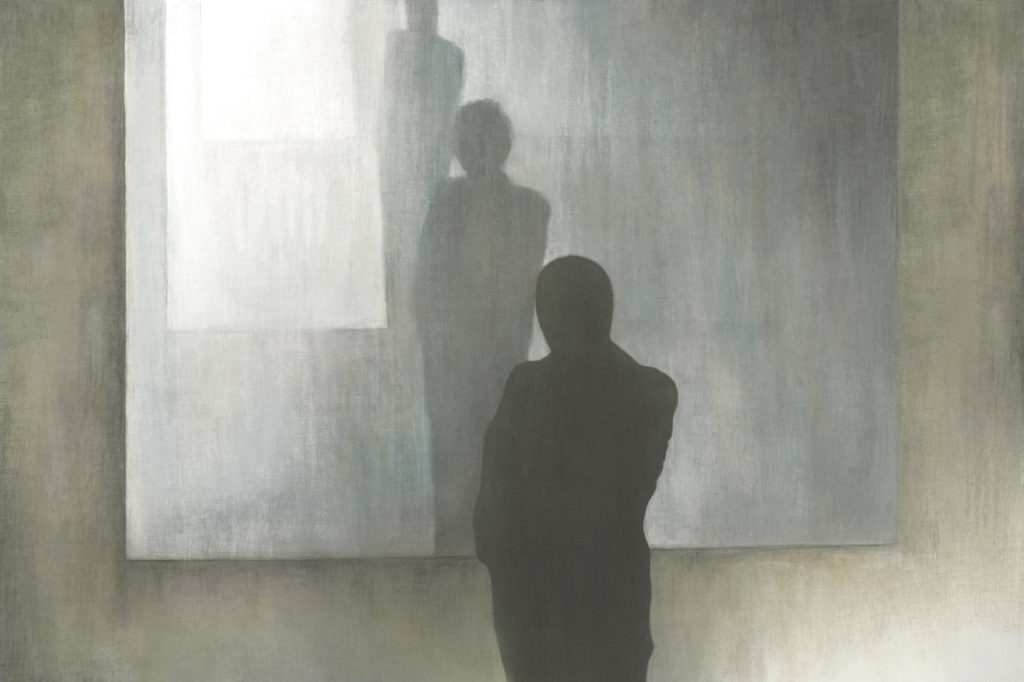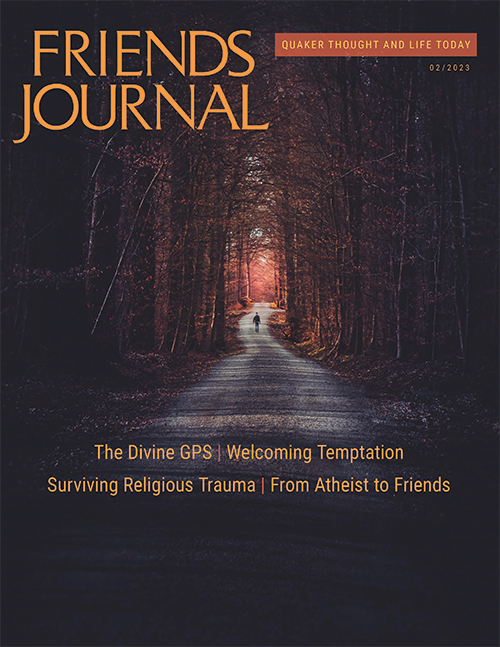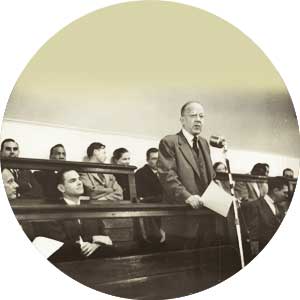Welcoming a Questioning Agnostic
The recorded number of Quakers in North America peaked at just under 123,000 in 1967. Since then, like most organized religions, the Religious Society of Friends—what Quakers call themselves—has lost members: some 20,000 over the last 30 years. They did, however, recently pick up one adherent: me. For years, decades even, I considered myself a run-of-the mill atheist. Now I am not so sure, and the Society of Friends is a welcoming religion in which to practice that uncertainty.
Until recently, my spiritual history could fit on the back of a postcard. When I was a boy, my mother took my sister and me to Christmas and Easter services. Other than that, religion played a negligible role in our lives. When I went to college, I took a couple of philosophy classes, which confirmed what had been until then an amorphous atheism. And a few years later, after the September 11 attacks, I would briefly fall under the spell of New Atheists like Richard Dawkins, Sam Harris, and Christopher Hitchens.
That is where things stood until I wrote a book about Walt Whitman, whose pantheism and optimism about eternal life I found comforting but ultimately implausible. While writing that book, however, I did downgrade myself from atheist to agnostic. I ran up against phenomena like the fine-tuned universe: the observation that if half a dozen or so physical constants differed in the slightest, neither life nor the universe that gives life could exist.

Cover image for the author’s 2015 book about Walt Whitman.
Around the same time, I also began to drift toward a radical humility. I realized that there is more that we do not know than that we do, and no one knows what future knowledge will reveal. For example, physicists and astronomers have several theories about why the universe seems so finely tuned. Perhaps there are or have been many universes, billions, and so it should not surprise us that suns, planets, humans, and elements exist in the one universe we happen to find ourselves in. But that is a hypothesis; no one knows for sure. And if no one knows, then I hesitate to say that I do. Instead of starting out from a belief that God does not exist and then looking for nontheistic explanations of the universe, I decided to start with no presuppositions and see where the evidence led. For me now, as with most agnostics, the jury is still out.
That brings us to the Quakers. While writing the Whitman book, I was reminded that his parents, while never formally belonging to the Religious Society of Friends, did sympathize with the religion and with Elias Hicks, the Quaker reformer and, as it happened, their Long Island neighbor and fellow farmer.
I filed that connection away until, for another book, I began to think about the problem of wealth in the United States of America. In looking for solutions to how runaway wealth has warped American life, I returned to the Quakers and their testimony of simplicity. For the first Quakers, simplicity meant plainness: in dress, in speech, and in possessions. Those early Quakers believed that plainness eliminated whatever might distract them from their relationship with God. In more recent years, Quakers continue to believe in eliminating superfluities—including, and especially, the avalanche of things Americans buy—in order to focus on what truly matters. But plainness has also evolved into simplicity, which took on additional environmental and social commitments. That testimony of simplicity insists that individuals should not use or claim more than their fair share of wealth and natural resources.
As a lapsed socialist, I already believed in the virtue of simplicity, especially its more recent definition. So too, as it happened, I believed in the other virtues that guide Quaker life: peace, integrity, community, equality. (For a religion committed to plainness, the acronym for these virtues is, paradoxically, “spice.”) The only thing missing from my road to Quakerism was a belief in God.
But here is where Quakers make room for those people, like me, who have punted on the question of whether God exists. Early Quakers believed that individuals could have a direct experience of God. “There is that of God in every man,” George Fox, an early minister among the Religious Society of Friends, said on too many occasions to count. I take him to mean not that everyone is God or a god—Walt Whitman thought that—but that God can make himself at home in each of us. Quakers therefore did away with most of the trappings of Christianity: clergymen, baptism, even revelation. None of these could match the direct experience of God. Quakers also adopted an unorthodox form of worship. Instead of listening to what priests or pastors had to say, they worship in silence and listen for God, and sometimes they speak when they believe God has given them something to say.
For me, the skepticism toward revelation is crucial. I admire the Christ of the New Testament, the teacher who sympathizes with the poor, the sick, and the outcast; the prophet who proclaims that God remembers every sparrow and the very hairs on our head. But when Christ informs his disciples that his Second Coming will occur within their lifetime, and when it does not, I start to wonder. So much of what Christ preaches—give up your riches, ignore your family—depends on the prospect of an imminent judgment. I also have serious doubts about the doctrine of original sin and, thus, the need for anyone to atone for it.

Quakers make room for those people, like me, who have punted on the question of whether God exists. . . . “There is that of God in every man,” George Fox, an early minister among the Religious Society of Friends, said on too many occasions to count. I take him to mean not that everyone is God or a god but that God can make himself at home in EACH OF us.
In addition to devaluing revelation, more recent Quakers have also recast the God whom they listen for and who may speak to them. Liberal Friends, like the ones who populate the meeting I attend in central Pennsylvania, believe that God may take different forms for different people: from the singular entity described in the Bible to a more diffuse figure. In 2017, Philadelphia Yearly Meeting approved the latest version of its Faith and Practice, a guidebook of sorts for Quaker bodies. In addition to God, it refers to “the Divine” and to “the Light Within.” But it allows that even those references may be too prescriptive. As Faith and Practice observes:
Friends have used many terms or phrases to refer to the inner certainty of our faith: the Light Within, the Inner Light, the Christ Within, the Inward Teacher, the Divine Presence, Spirit, the Great Spirit, the Spirit of Truth, that of God in every person, and the Seed. . . . In contrast with early Friends, not all Friends today consider themselves to be Christians or even theists. Friends come from very diverse religious backgrounds and experiences and apply their different perspectives as they encounter the Light Within.
With belief in neither God nor the Bible required, some might think that for Quakers just about anything goes. And they would not be wide of the mark. As Quaker historian Ben Pink Dandelion has written: “Liberal Quaker diversity can look like a supermarket religion, a pick-and-mix approach.” Indeed, about the only thing Liberal Friends agree on is that when it comes to God or the Divine or the Light Within, they do not need to agree on anything. Instead, they commit to a theology of the “absolute perhaps.” As the same historian has put it, spiritual truth for Quakers is “partial, personal, and provisional.” Everyone ministers to themselves—with an occasional stab at conveying to others what has been conveyed to them.
What do I do during the hour we spend in silent worship every Sunday? I think about how well—or how poorly—I’ve practiced Quaker virtues the previous week and how I can practice them better in coming weeks. I also enjoy the reprieve that silence offers from the barrage of voices—books, newspapers, music, and the Internet—competing for my attention. But mostly I listen, by which I mean I remain open to whatever God or the Divine or the Light Within may have to communicate to me. Thus far, I cannot say if any of these entities has spoken to me. But I have had thoughts—epiphanies even—that only came because I spent an hour in silence. And for now, I do not much care where those thoughts came from, whether from me or from God. I am only grateful they came, and grateful to Friends for building and maintaining a place where they can come.




![[Images from the most widely read articles of early 2023.]](https://www.friendsjournal.org/wp-content/uploads/2023/07/2023-so-far.jpg)

Thank you for this warm, open essay about your spiritual journey and ponderings, John. A few thoughts rose as I was reading.
You said: “But when Christ informs his disciples that his Second Coming will occur within their lifetime, and when it does not, I start to wonder.”
For me, Jesus was human and Christ spoke through him in the way that Christ sometimes speaks through Friends in worship. What I take from things that Jesus said in passages like Matthew 16:28 is not that there will be a rapturous Second Coming but that some of his disciples will know Christ (or That of God) within themselves. This feels to me more about becoming inwardly transformed rather than a failed End Times prophecy.
Later: “So much of what Christ preaches—give up your riches, ignore your family—depends on the prospect of an imminent judgment.”
Doesn’t this actually speak to the theme of plainness and simplicity? I take these kinds of directives as invitations to do one’s own inner/ego work. For me, sin is anything I allow to come between me and God. This could be security or riches, my family, a talent, or really anything; it could even be a fear or a shame that keeps me from knowing God’s presence. When Jesus told the Rich Young Man to give up his riches, I think he was saying that the RYM put his wealth before his relationship with God. In order for RYM to draw closer to God, he had to give up the thing he was clinging to. I have experienced the same, not with money but in other ways.
Pantheism is the belief that God is everything. As I understand it, panENtheism is an awareness that God created everything and I can be reminded of God and drawn into closer relationship with the Spirit by being present to the physical world around me. It is easy for me when I notice the budding leaves and feel the warm sun on my face to remember that this is God’s world. Less easy when I am annoyed by the loud condenser motor next door but it is also a part of God’s world and when I allow myself, I can experience it too as a reminder to turn to my Beloved Creator.
With love,
Mary Linda
What a beautiful, and for me, reaffirming essay. Though raised in the Meeting, and though my mother was a member, neither she nor I had a belief in god or Christianity. Still, all my values are completely in tune with Quaker values, and I am very at home in Meeting. I guess I feel a sense of spirit in all things of nature, though I don’t know what that means other than my commitment to nonviolence to the living and nonliving elements of our world.
Thank you so much.
I agree with others that John Marsh’s remarks were wonderfully written and entirely authentic. I am also a published author, an academic political scientist and Middle East specialist, and have found my heart’s home at Muncie Friends Meeting which has been undergoing a transformation from a mainstream protestant church to a Friends Meeting. It has been exhilarating for me, and I am grateful for the many who have come before me in establishing the Quaker approach to Joshua of Palestine and to finding ways to engage the Creating by means of him and the “Spirit” forces that (for me), because of him, help me connect to Creation and the Creating. I am about 37/46ths toward theism from agnosticism and still moving in the theistic direction. Not that it makes any difference. I just try to maintain the “habits of the heart” and keep going. As for God, Professor Marsh, just hope you never know ontologically what he/she/it is, for when that happens your brain will have departed. Just let your brain/endocrine system enjoy the silence and become more and more connected to Creation and its sustaining forces. Prayer and meditation work because those forces are at work, independently of our “pale cast ‘O thought”. I do believe at least two things: that Quakers are an important “mustard seed” for our shaping of the “Kingdom” and that there is no beginning or end to Creation or the power of its infinite dimensions. I further hypothesize that we have all always lived in some form or other and will always live in some form or other. Thus, there can be no ontological insecurity, and we can only sincerely try to do the best we can. Many, in the past, have tried to do so, and we inherit the fruits of their endeavors. After considerable study, I have found Joshua of Palestine (Jesus) to be the main marker for me in this endeavor. But he is not alone, nor are we.
In and out of the light,
Charlie Winslow